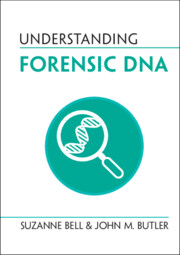Book contents
- Understanding Forensic DNA
- Understanding Life
- Understanding Forensic DNA
- Copyright page
- Reviews
- Dedication
- Contents
- Foreword
- Preface
- Acknowledgments
- 1 Biological Identification
- 2 Before DNA
- 3 First-Generation Forensic DNA
- 4 STR Methods and Loci
- 5 DNA Analysis and Interpretation: Single-Source Samples and Simple Mixtures
- 6 The Curse of Sensitivity
- 7 From Mothers and Fathers
- 8 Emerging Technologies
- 9 Emerging Issues
- Concluding Remarks
- Summary of Common Misunderstandings
- References and Further Reading
- Figure Credits
- Index
6 - The Curse of Sensitivity
Published online by Cambridge University Press: 02 September 2022
- Understanding Forensic DNA
- Understanding Life
- Understanding Forensic DNA
- Copyright page
- Reviews
- Dedication
- Contents
- Foreword
- Preface
- Acknowledgments
- 1 Biological Identification
- 2 Before DNA
- 3 First-Generation Forensic DNA
- 4 STR Methods and Loci
- 5 DNA Analysis and Interpretation: Single-Source Samples and Simple Mixtures
- 6 The Curse of Sensitivity
- 7 From Mothers and Fathers
- 8 Emerging Technologies
- 9 Emerging Issues
- Concluding Remarks
- Summary of Common Misunderstandings
- References and Further Reading
- Figure Credits
- Index
Summary
The last chapter outlined the basic concepts of mixture analysis. Now we move on to the much more challenging situations arising from low-level DNA samples and complex mixtures. These topics go together. Early DNA methods such as RFLP and initial PCR methods were less sensitive (which means they were unable to detect very small quantities of DNA) than today’s techniques. As a result, DNA present in tiny quantities was not seen. Now the technologies afford much better detection, which is a mixed blessing. Rather than simply detecting the DNA from the major contributor(s), now trace levels of DNA can be recovered and typed, and not all of it is pertinent to the crime under investigation. Very small amounts of DNA, much less than in typical samples, are referred to as low copy number (LCN) DNA.
Low copy number and complex mixtures are related.
Keywords
- Type
- Chapter
- Information
- Understanding Forensic DNA , pp. 93 - 108Publisher: Cambridge University PressPrint publication year: 2022

